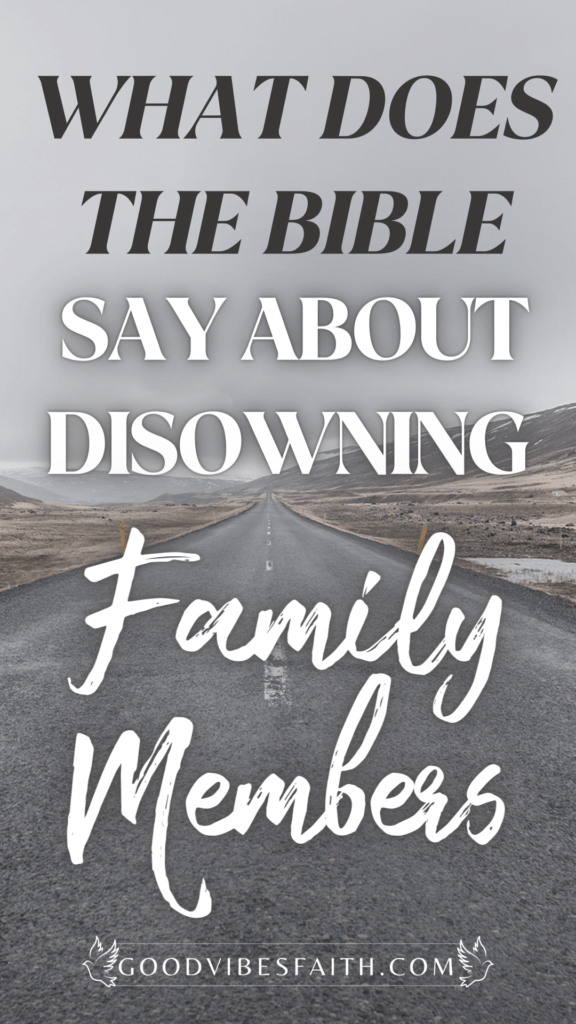What Does The Bible Say About Disowning Family Members? Surprising Biblical Advice on Cutting Ties With Loved Ones

The Bible is often seen as a source of moral guidance, and it does offer some pretty clear instructions on how to behave. But what about when the Bible seems to suggest doing something that goes against our intuition or feelings? That’s what we’re exploring in this blog post – specifically, what does the Bible say about disowning family members? As it turns out, the answer may be surprising!
Is it Biblical to walk away from family?
When we think about disowning family members, it’s usually in the context of someone doing something that is so terrible or disgraceful that the rest of the family wants nothing to do with them. For example, a child who commits a heinous crime, or a relative continuously engages in something that brings shame to the family.
In some cases, disowning may be seen as a form of protection. For example, if someone in the family is being abused by another member, disowning that person may be seen as the best way to protect themselves and other loved ones.
So what does the Bible say about disowning family members? Let’s take a look!
The first thing to note is that, in the Old Testament, families were often much larger and more extended than they are today. So when the Bible talks about ‘family members’ it could be referring to anyone from a close blood relative to a more distant cousin or even just someone who was part of the same tribe. With that in mind, let’s take a look at some of the relevant passages.
Deuteronomy 21:18-21 says,
“If someone has a stubborn and rebellious son who does not obey his father and mother and will not listen to them when they discipline him, his father and mother shall take hold of him and bring him to the elders at the gate of his town. They shall say to the elders, “This son of ours is stubborn and rebellious. He will not obey us. He is a glutton and a drunkard.” Then all the men of his town are to stone him to death. You must purge the evil from among you. All Israel will hear of it and be afraid.” Deuteronomy 21:18-21 (NIV)
This passage seems to suggest that, in some cases, disowning a family member may be seen as a way to protect the rest of the community. Of course, this would only be in cases where the person in question was seen as a danger to others, and not simply because they were different or didn’t conform to the family’s expectations.
Another relevant passage is from Matthew 15:21-28, which says,
“Then Jesus left Galilee and went north to the region of Tyre and Sidon. A Gentile woman who lived there came to him, pleading, “Have mercy on me, O Lord, Son of David! For my daughter is possessed by a demon that torments her severely.” But Jesus gave her no reply, not even a word. Then his disciples urged him to send her away. “Tell her to go away,” they said. “She is bothering us with all her begging.” Then Jesus said to the woman, “I was sent only to help God’s lost sheep—the people of Israel.” But she came and worshiped him, pleading again, “Lord, help me!” Jesus responded, “It isn’t right to take food from the children and throw it to the dogs.” She replied, “That’s true, Lord, but even dogs are allowed to eat the scraps that fall beneath their masters’ table.” “Dear woman,” Jesus said to her, “your faith is great. Your request is granted.” And her daughter was instantly healed.” Matthew 15:21-28 (NLT)
In this passage, we see Jesus interacting with a Canaanite woman who is pleading for him to heal her demon-possessed daughter. At first, Jesus seems to dismiss her, saying that he was sent only to the lost sheep of Israel. But the woman persists, and Jesus ultimately grants her request. This story shows us that, even when we may feel like we are being excluded or rejected, it’s important to keep faith and hope alive.
So what can we learn from these passages? Firstly, disowning family members is not something to be done lightly. It should only be considered in cases where the person in question is seen as a danger to others, or when their behavior is so destructive that it threatens the well-being of the rest of the family. Second, we see that even when we are rejected by our loved ones, we should never give up hope. We never know when they may come to see things differently and welcome us back with open arms.
While the Bible doesn’t explicitly say whether or not it’s okay to disown family members, several scriptures suggest it’s not a good idea:
While the Bible doesn’t explicitly say whether or not it’s okay to disown family members, several scriptures suggest it’s not a good idea.

“For God so loved the world, that he gave his only Son, that whoever believes in him should not perish but have eternal life.” John 3:16 (ESV)
This verse from John shows us that God is willing to sacrifice his own son for our sake. If we can’t even love our own family members, how can we love God?
“But if anyone does not provide for his relatives, and especially for members of his household, he has denied the faith and is worse than an unbeliever.” 1 Timothy 5:8 (ESV)
This verse from Timothy tells us that it’s our responsibility to take care of our family members. If we abandon them, we’re not only going against the Bible, but we’re also worse than those who don’t believe in God.
“Honor your father and mother”—which is the first commandment with a promise— “so that it may go well with you and that you may enjoy long life on the earth.” Ephesians 6:2-3 (NIV)
This verse from Ephesians shows us that God wants us to honor our parents. If we don’t, we won’t be blessed.
In the book of Luke, Jesus tells a story about a man who was forgiven by his father after he ran away and squandered his inheritance. When the son humbly returned, hungry and repentant, his father welcomed him back with open arms.
“His son said to him, ‘Father, I have sinned against both heaven and you, and I am no longer worthy of being called your son.’ But his father said to the servants, ‘Quick! Bring the finest robe in the house and put it on him. Get a ring for his finger and sandals for his feet. And kill the calf we have been fattening. We must celebrate with a feast, for this son of mine was dead and has now returned to life. He was lost, but now he is found.’ So the party began.” Luke 15:21-24 (NLT)
This story is often interpreted as a parable about forgiveness, but it also contains an important lesson about disowning family members. This story teaches us two important lessons.
First, we see that even when our loved ones reject us, we should never give up hope. Second, we see that forgiveness is always possible, and it is always worth pursuing.
But some people are evil, does the Bible want us to tolerate an evil family member?
The Bible does not condone evil, and it certainly doesn’t tell us to tolerate evil people, family members or not. In Psalm 5, we are told to not associate with evil doers,

“For you are not a God who is pleased with wickedness; with you, evil people are not welcome.” Psalm 5:4 (NIV)
and in Psalm 101,
“The perverse of heart shall be far from me; I will have nothing to do with what is evil.” Psalm 101:4 (NIV)
we are instructed to remove the wicked from our presence. So if you have an evil family member, the Bible does not tell us to just sit back and tolerate them.
But what about situations where someone isn’t evil, but they’re just really difficult to get along with? Maybe they’re always causing drama or they’re just really negative and bring everyone down. In those cases, the Bible does give us some advice.
In Matthew 18:15-17, we are told to go to that person privately and try to work things out between the two of you. If they listen to you, then great! But if they don’t, then you are supposed to take one or two other people with you and try again. And if that doesn’t work, then you are supposed to tell the whole church about the situation.
So basically, the Bible is telling us to exhaust all options before just giving up on someone. We are supposed to try to work things out, even if it’s really difficult. And that’s good advice for any relationship, not just family relationships.
So, the Bible does condone disowning family members, but only in cases where those family members are evil. We are not to tolerate evil, and we are to confront it head-on. If someone will not listen to us, then we are to cut ties with them. Evil relatives are to be disowned, and we are not to have any contact with them.
What the Bible does say about disowning family members: Conclusion
The Bible is often seen as a source of comfort and guidance in difficult times, and it offers some surprising advice on cutting ties with loved ones.
When we are faced with the decision to disown a family member, we must remember that our ultimate loyalty is to God. We are called to love our enemies and pray for those who persecute us. This doesn’t mean that we have to tolerate abuse or allow ourselves to be mistreated. But it does mean that we should try to see the best in people, even when they make it difficult for us to do so.
The Bible also tells us that it’s our responsibility to take care of our family members. If we abandon them, we’re not only going against the Bible, but we’re also worse than those who don’t believe in God. And finally, we are told to honor our parents. If we don’t, we won’t be blessed.
So, while the Bible doesn’t give a definitive answer on whether or not it’s okay to disown family members, the overall message is clear: it’s better to love and forgive than to turn our backs on those we are supposed to care about. That being said, there is evil in the world, and there can be evil in a household. If someone is mistreating you or your family, the Bible does not condone that behavior. In those cases, it may be necessary to cut ties with toxic family members to protect yourself and your loved ones.
We should pray for wisdom and guidance when making decisions about whether or not to disown a loved one, and trust that God will lead us in the right direction.







